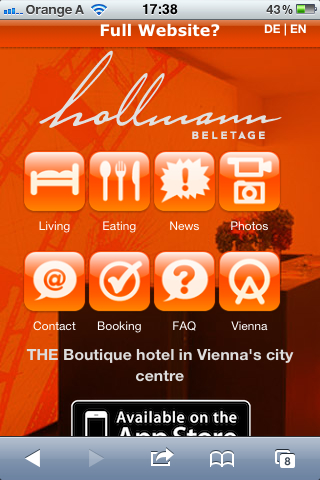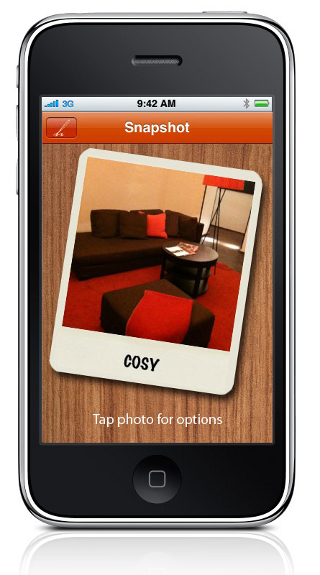Slick mobile lessons from a small design & boutique hotel
Understanding your customer inside out, taking lessons from others who have done it well, knowing how much you have to spend and getting the right technology partner on board are all key to a good design strategy. Pamela Whitby hears about the mobile strategy of one design & boutique hotel which has also taken a few risks.
Most hoteliers should now understand the importance of reviews. But would they go as far as building a function into their mobile website so that guests can load entirely independent snaps or reviews of the room, restaurant or facilities to the company’s own website in real-time? It certainly sounds like a risky strategy but this is exactly what Viennese design & boutique hotel, Hollmann Beletage, has done.

You have to be really confident in your product and service but you also need to know your customer. When it comes to heading down the mobile strategy Philipp Patzel, general manager at Hollmann Beletage, cannot stress enough how important it is to understand and analyse your target market, know what you are hoping to achieve and what you can afford. “When developing a mobile strategy the first and most important thing you need to do is understand your market inside out,” he says. If you have a highly loyal returning customer base, for example, then a state-of-the-art app might just deliver a return on investment. If you’re a predominantly leisure outfit, a mobile booking engine probably isn’t so important, but if you’re a business hotel it definitely is.
Numbers from the big OTAs like Priceline and Expedia find that 60% to 80% of bookings made on mobile are for the same day and are made with 25 kilometres of the hotel. For this reason, users searching for hotels on a particular day won’t have to enter time and location. This suggests they may be business travellers, or perhaps backpackers looking for a last-minute deal. In this case how your mobile site deals with the considerations of time, immediacy and proximity of location is crucial. Many of the big OTAs will only deliver nearby hotels in search results of somebody looking for a hotel on a mobile. But it is important to remember that people are also using their mobiles to research travel and they then go on and complete the purchase on a desktop.

A results driven approach
For Patzel there are four phases in the mobile purchasing process:
1. Inspiration and engagement: Remember when a person is using the mobile in the research phase, they may well be in a place where there are lots of distractions such as on a train or bus. So the site should create engage and encourage discovery and maintain focus. This means lots of pictures or it could mean a game. Hollmann Beletage has developed a memory game which allows potential guests to discover parts of the hotel.
2. Evaluation and information– offer the user appropriate information in a very functional easy way: where is the location, how much does it cost, what does a standard/deluxe room look and so on.
3. Purchase: It is very important to ensure that the mobile website also switches to a mobile version of a booking engine. This is mainly down to ease of use; entering numbers into a normal booking engine can be very frustrating and you could lose customers. In many hotels the mobile website still switches to a normal booking engine. “Our own mobile website is not yet there as we had problems with a technology partner,” says Patzel
The fact that many consumers are not yet sure about spending big amounts via mobile is another reason to ensure that this function is as simple as possible.
4. After sales– At this point you need to engage customer loyalty. This could be encouraging them to connect Facebook to become a friend, click into a hotel newsletters and so on.
If you have these four steps in place, says Patzel, then you are well on your way to having a functional mobile website. Many firms are however not there yet so what are the mistakes to avoid.
Don’t
• Replicate the desktop. It should be seamless and simple offering a functional user experience or you probably won’t get that customer coming back; 80% of users quit the mobile website immediately if they have a bad experience.
• Offer too much information which may diminish the user experience. Time and functionality is of the essence so avoid large data and flash tools.
Do
• Make it easy for the customer to book in any way he wants
• Understand that speed really does matter. Pages need to load quickly so be aware of photo resolution.
• Always give users an option to switch to the desktop site if they want more information.
• Look closely at the mobile sites of some of big OTAs which have got simplicity and functionality well.
So what to spend and how to spend it?
When it comes to the mobile website, you can spend as little as €500 or then again you can go for “Rolls Royce solution,” says Patzel. But ultimately you will have to justify your decision to management so be prepared. Having said all that Patzel stresses that it is “crucial to be online and on the smartphone” and by that he means having a mobile website. “We have a both a mobile website and a native mobile application, but the website should come first,” he says. While a lot of hotels are keen on apps because they are “cool and state-of-the-art” Patzel warns that they are very expensive to design and certainly not good for every market. Where they do work well is in loyalty programmes, but he only recommends the app road if you have regular returning customers. “With apps you could easily spend the price of a car without really knowing what ROI is,” he says.
But you not need all the bells and whistles. It comes down to understanding your market. For those firms on a budget, Patzel also argues that there are ways of being mobile without having a mobile app or mobile website. As already mentioned you can get away with your desktop site on the mobile if it is well-designed with no flash applications. You can claim your own location-based services like Yelp and Foursquare, and name your Google+ place. And of course then there is Facebook.
So whatever your budget, there really is no excuse. Mobile is here and you need it.
Philipp A.L. Patzel, General Managerat the Viennese Austrian Design & Boutique hotel Hollmann Beletage will be sharing more insights at EyeforTravel’s Online Marketing, Mobile & Social Media in Travel, Europe 2012 on Oct 3 and Oct 4

